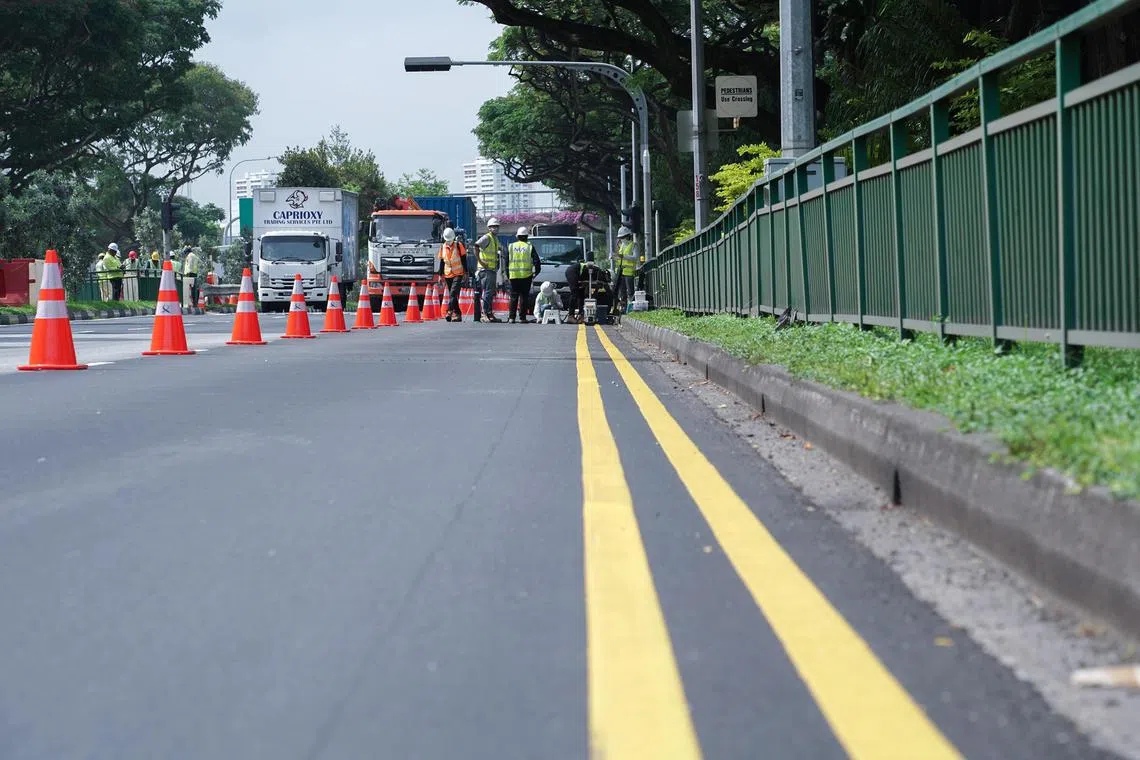LTA trials use of plastic waste to pave roads
Sign up now: Get ST's newsletters delivered to your inbox

A stretch of West Coast Highway that has been paved with a new plastic-composite material made from local recycled plastic waste.
PHOTO: AMY KHOR/FACEBOOK
SINGAPORE – Sections of the West Coast Highway, the Pan-Island Expressway and Jalan Buroh in Boon Lay have been paved with asphalt that incorporates recycled plastic waste.
This is part of trials that the Land Transport Authority (LTA) is conducting to assess the feasibility of greener road surfacing materials and improve their durability.
Various field tests are being carried out until the first quarter of 2024 to measure factors such as noise reduction, heat absorption and road roughness.
In a Facebook post on Friday, Senior Minister of State for Transport Amy Khor said the new road mixes may be used on selected expressways and roads if they are found to be acceptable. “I’m heartened that we are taking on more of these green initiatives in our drive for transport sustainability,” she wrote.
In response to queries, LTA said it is testing out two asphalt mixes that have plastic waste in them and are targeted at different road applications.
The trial in Jalan Buroh uses readily available clean plastic waste as an additive to enhance the performance of road segments that have heavy loads, such as industrial roads with slow-moving heavy vehicles.
Earlier tests of this mix, which is based on existing technology, showed a 30 per cent improvement in performance over the existing asphalt mixes, LTA said.
This project is a collaboration between LTA, the National Environment Agency, Singapore Polytechnic and local construction company Samwoh.
Meanwhile, the trial at the West Coast Highway and Pan-Island Expressway uses a new plastic-bituminous composite asphalt mix that LTA developed in collaboration with the National University of Singapore.
LTA said this new road mix is meant for general application, and it involved a complete redesign of how asphalt mix is produced.
This new material is also expected to help reduce road noise and improve urban cooling without compromising performance.
The idea of using recycled materials for road construction is not new. LTA changed road construction specifications in 2010 to allow the use of recycled waste materials. This came after it had conducted a trial the year before on a 200m stretch of Tampines Road made using processed construction waste material recycled from the milling of defective portions of road and processed incinerated waste from landfills.
Since June 2020, the authorities have also been testing NewSand, a material created from repurposed municipal solid waste, for the layer of material directly below the asphalt in a stretch of Tanah Merah Coast Road.
Asphalt mixes that incorporate recycled plastic waste have been in use overseas since the early 2000s, in countries such as India, Indonesia and Britain.
On Friday, LTA said it is in early discussions with Magorium on its proposal to trial its new product, NewBitumen, on public roads.
Separately, LTA has said that it will use a low-noise asphalt mix that uses materials such as latex and rubber when resurfacing some sections of expressways here. There are plans to use this low-noise mix in 2025 for a stretch of Tampines Expressway that intersects Sengkang and Punggol.
“Besides doing our part for the environment, we also hope to find better-performing road surfacing materials,” it added.



